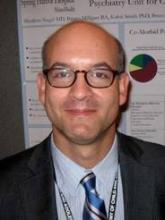SAN FRANCISCO – Thirty-five children with autism or developmental disorders significantly improved their behavioral functioning after an average 40-day stay in a specialized inpatient psychiatry unit, with most of the improvements sustained 2 months later.
The inpatient unit is 1 of 10 in the United States that exclusively serves children with autism or intellectual disabilities from developmental disorders. Until now, the outcomes from these units have not been prospectively studied using standardized measures, Dr. Matthew S. Siegel said.
In this prospective study, a primary caregiver completed the Aberrant Behavior Checklist–Irritability (ABC-I) subscale for a patient at admission, at discharge, and at the 2-month follow-up. Eighteen patients had autism spectrum disorder, and 17 were nonautism youths with intellectual disability attributable to developmental disorders.
The mean ABC-I score decreased significantly by more than 12 points between admission and discharge, Dr. Siegel reported in a poster presentation at the annual meeting of the American Academy of Child and Adolescent Psychiatry.
Mean scores for youths with autism decreased from approximately 25 to 13, and were at approximately 14 at the 2-month follow-up. Mean scores for the nonautistic youths decreased from approximately 20 at admissions to approximately 8 at discharge, and rebounded to approximately 16 at the 2-month follow-up.
The treatment effect on the youths, aged 5-12 years, was "greater than that of any particular medication or behavioral treatment that’s been studied. That’s not a surprise, because we’re a multimodal treatment. We apply behavioral analysis, the best-evidenced psychopharmacologic intervention, occupational therapy, [and] speech therapy. It’s a concentrated intervention," he said in an interview at the session.
Comorbid psychiatric diagnoses were decided by expert consensus based on extended daily observation of the patients in the hospital. Validated diagnostic tools are lacking for psychiatric comorbidity in children with autism and other developmental disorders, noted Dr. Siegel, director of the developmental disorders treatment unit at Spring Harbor Hospital, Westbrook, Maine.
Anxiety disorders were present in 68% of autistic youths and 71% of the nonautistic youths. Disruptive behavior disorder was seen in 17% and 88%, respectively, and mood disorders were seen in 11% and 24%. Twenty-two percent in the autism group and 24% in the nonautism group had a disorder of infancy or early childhood such as attachment disturbance, Tourette’s syndrome, or a tic disorder not otherwise specified, said Dr. Siegel, also of Tufts University, Boston.
The outcomes on the ABC-I did not differ significantly between those in the autism group and the nonautism group. The mean age in the autism group was 13 years, and the mean age in the nonautism group was 12 years. Six patients were females, and 29 were males.
The study included no control group because of ethical considerations, he said.
Patients in the study typically had limited speech or were nonverbal, aggressive, or self-injurious on a daily basis, and had failed multiple other interventions.
Dr. Siegel and his associates next will assess outcomes for these patients at 6 months. A future study will compare outcomes between specialized and general psychiatric units, and investigate the longer-term sustainability of outcomes.
Previous studies have reported that children with autism are 11 times more likely to undergo psychiatric hospitalization, compared with neurotypical children, Dr. Siegel said.
The 10 specialized inpatient psychiatric units in the United States (like the one in this study) recently formed a consortium that is talking to potential funders to conduct joint research. "We have a big population of the nonverbal and self-injury subgroup," Dr. Siegel said. "Those are groups that have been ignored in research. I think we have a really exciting opportunity."
Dr. Siegel is employed by the hospital whose program was studied. He reported having no other relevant financial disclosures. The Maine Medical Center Research Institute and the Pond Family Foundation funded the study.


